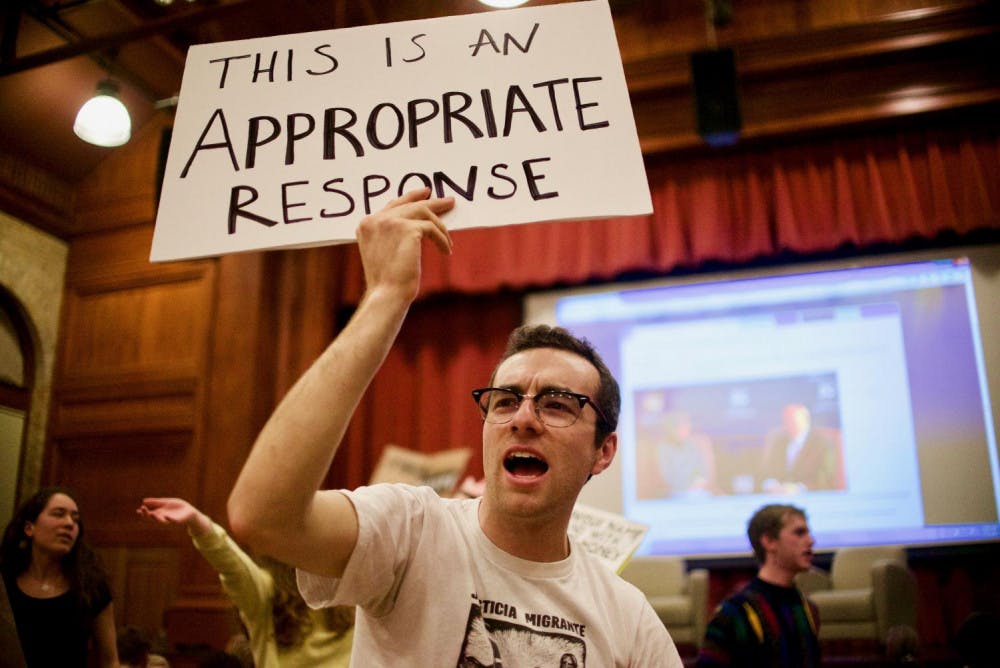[gallery columns="1" ids="47729,47728,47727"]
President Laurie Patton announced the college’s new Policy on Open Expression in an all-school email on Nov. 21. The policy, she wrote, was changed in conjunction with an updated version of the policy on demonstration regulations. Together, the policies constitute the college’s rules about student protest.
The newest version of both policies, which are part of the 2019–2020 Student Handbook in sections A.5 and C.4, make clearer distinctions between “disruptive action” and “substantially disruptive action.” The Policy on Open Expression also more explicitly acknowledges the educational value of protests, and states that the college “recognizes the historical importance of nonviolent public demonstration and protest.”
These changes, among many others, were made following a two-and-a-half year process of reflection on the college’s protest policy after the protest against Charles Murray in 2017. Following that incident, the college convened a Committee on Speech and Inclusion, made up of students, faculty and staff, which made some general recommendations about hosting controversial speakers. The SGA also contributed suggestions in the form of a bill that May.
The college has since seen two drafts of a new policy — the first which was shared on Nov. 15, 2018, and the second on May 19, 2019. The 2018 draft, which was crafted using feedback from two open meetings held that fall, defined “civil disobedience” as a punishable violation of college policy, among other additions. It was widely criticized for ambiguities in its language.
The 2019 draft more closely reflected the finalized updated policy. That policy was created by a Policy Working Group of students, faculty and staff. According to Michael Sheridan, group member and professor of anthropology and African Studies, the group looked to other college’s policies for reference.
“I was deeply concerned about the [2018] policy’s retributive impulses, which is why I was one of a handful of students who voiced concern and led a teach-in to engage students in the process of proposing a more holistic protest and demonstrations policy,” said Grace Vedock ’20, a member of the Policy Working Group and student activist.
Members of that group told The Campus they are generally pleased with the new finalized policy, and feel it reflected their recommendations.
“[We] worked for two years on this issue and developed two statements that have both been adopted,” said Amy Briggs, a group member and professor of computer science, referring to both the statement on Academic Freedom, Integrity and Respect that faculty crafted in spring 2018, as well as the May 2019 policy draft. The 2018 statement “now appears as a preamble to the institution-wide policies in the Handbook,” Briggs said.
The new policy is “clearly built around the key components of the framework created by the policy committee and voted on by the faculty at the end of the spring semester,” said Renee Wells, a group member and the director of education for equity and inclusion.
“I’m very happy that the new policy clarifies how our community should interact when faced with controversy,” Sheridan said. “We will be a stronger community, and this policy will, I hope, be the foundation for building more trust on our campus.”
Sheridan highlighted what he sees as important aspects of the new policy, including the clarification that open expression affirms the aforementioned three pillars from the faculty statement, as well as the expansion to allow all members of the campus community to “engage in personal activity involving protest and demonstration to express one’s own ideas.” The 2018 draft said that members of the Senior Leadership Group could determine that some staff positions were “incompatible” with participation in certain manifestations of expression at the college; now, staff are also free to protest under policy guidelines without fear of getting fired, according to Sheridan.
“This expansion of the pillars to include staff will, I hope, enhance respectful relationships in our community,” Sheridan said.
Despite mostly positive feedback, Vedock emphasized the importance of continued actions to improve the campus environment around protest.
“Though I am optimistic about this new policy, I remain concerned about a campus environment that is, in my opinion, hostile to student protest,” Vedock said, explaining that she and fellow Policy Working Group member Taite Shomo experienced hostility last spring as they were planning a protest of the planned talk of right-wing Polish politician Ryszard Legutko who was planned to speak on campus.
“I hope that this policy is quickly followed by concrete and continued action that affirms these rights,” Vedock said.
According to Hannah Ross, the college’s general counsel and chief of staff, the administration intends the new policy to reflect the college’s “equal commitments to open expression and an inclusive community.” Ross reaffirmed the college’s “conviction that all community members can participate equally and all voices can be heard.”
In an all-school email on Nov. 1, President Patton described the college’s struggles over questions of speech and inclusivity as “a work in progress.” In addition to updating its policies, the college has also been working to strengthen relationships and planning practices with local law enforcement partners, and has developed workshops for students on college protest policy, amongst other projects.
New protest policy incorporates student and faculty input

Comments



